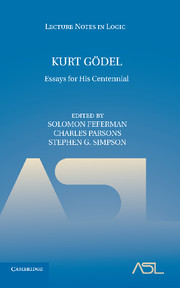Book contents
- Frontmatter
- Contents
- Introduction
- GENERAL
- PROOF THEORY
- SET THEORY
- PHILOSOPHY OF MATHEMATICS
- What did Gödel believe and when did he believe it?
- On Gödel's way in: The influence of Rudolf Carnap
- Gödel and Carnap
- On the philosophical development of Kurt Gödel
- Platonism and mathematical intuition in Kurt Gödel's thought
Gödel and Carnap
Published online by Cambridge University Press: 04 August 2010
- Frontmatter
- Contents
- Introduction
- GENERAL
- PROOF THEORY
- SET THEORY
- PHILOSOPHY OF MATHEMATICS
- What did Gödel believe and when did he believe it?
- On Gödel's way in: The influence of Rudolf Carnap
- Gödel and Carnap
- On the philosophical development of Kurt Gödel
- Platonism and mathematical intuition in Kurt Gödel's thought
Summary
“I once asked Carnap with which philosopher of the past he felt a close kinship,” writes Abraham Kaplan in a memoir. “His reply was Leibniz” (Kaplan [1991], p. 40). This feeling of kinship with Leibniz was something Gödel and Carnap had in common, and it distinguished them from the other members of the Vienna Circle and its following, who had less rationalist inclinations. However, Carnap and Gödel were in good company when we look more widely at the founders of modern logic and scientifically-oriented philosophy. Frege, Cantor, and Russell, among others, would likely also have named Leibniz if asked the same question. One obvious source of fascination for all these thinkers was Leibniz's idea of a universal deductive system, a calculus philosophicus or characteristica universalis, to connect all knowledge in a single, uniform deductive structure. The various efforts during the Enlightenment to classify and codify the new knowledge, in competition with theological and traditional lore, had overlooked or forgotten Leibniz's proposal, as had the subsequent positivist tradition. It was only with the more powerful logical tools developed in the later nineteenth century that Leibniz's dreams once again became relevant.
Of course these latter-day admirers of Leibniz diverged widely in their attitude toward this universal logical program. They diverged, for instance, along the left-right scale or “schema of possible philosophical world-views” that Gödel set up in a lecture written around 1961:
I believe that the most fruitful principle for gaining a perspective on the range of possible world-views [Weltanschauungen] will be to divide them up according to the degree and the manner of their affinity to or departure from metaphysics (or religion). […]
- Type
- Chapter
- Information
- Kurt GödelEssays for his Centennial, pp. 252 - 274Publisher: Cambridge University PressPrint publication year: 2010
- 4
- Cited by

